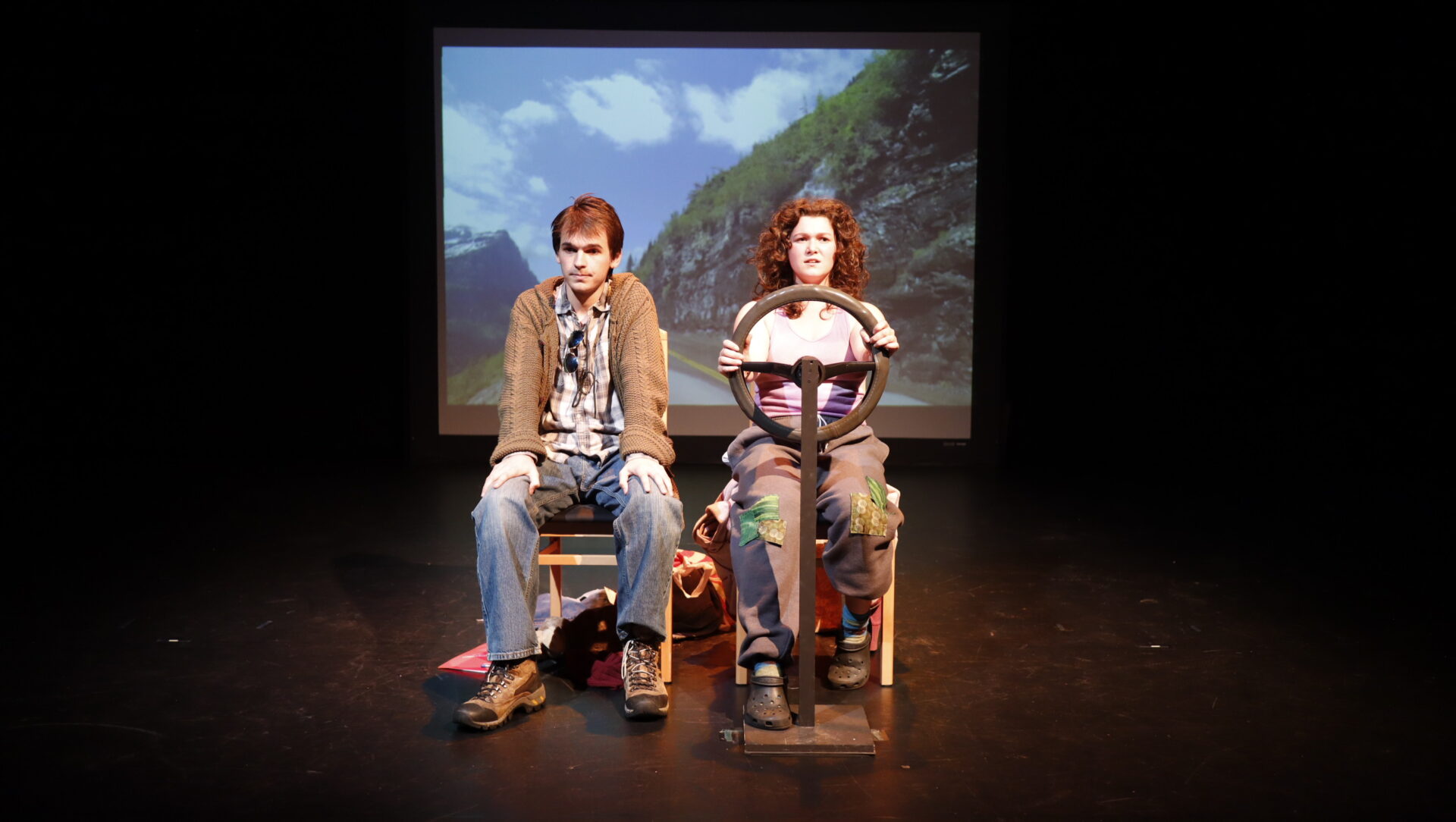
Content warning: This article discusses sexual assault and reproductive trauma.
Thespians and theater buffs rejoice, for Lewis & Clark’s theatre program is back in full swing for the 2021-22 school year. “STUCK!,” this year’s annual one-act festival, kicked off the season with three plays: “Sasha & Carlyle Make a TikTok” by LC student Niels Truman ’22, “Great Falls” by Lee Blessing and “Play” by Samuel Beckett.
“Sasha & Carlyle Make a TikTok” is set in 2020 at the start of quarantine. The two main characters, Sasha and Carlyle, are sent home from their semester abroad in London. Carlyle’s father falls ill, so they stay at Sasha’s house, where the rest of the play is set. The two friends have vastly different needs and ways of coping with the pandemic. This dissonance ends up creating a rift between them.
The idea for the play came from Truman’s similar experience. He went to London in Spring 2020 for a study abroad trip through Oberlin College, which is where he was enrolled before transferring to LC. Much like his characters, he was sent home mid-trip and he wrote the play as a class assignment and reaction to his situation.
Last semester, when the time came for students to propose plays for the one-act festival, Truman revisited his work.
“I remembered I had this one-act just sitting around, and I dug it out,” Truman said. “It felt so right, because live theatre was starting back up again, to have a play about the past year and a half in which there was no live theatre, and to represent this time period where we were not able to have community in a communal setting.”
Blessing’s “Great Falls” is a standard-length play from 2009. Director Gabe Reyes ’23 had to cut and streamline the work into one-act form.
The play features a 17-year-old girl and her estranged stepfather on an impromptu road trip to Montana during the summer before college. The girl is prickly, distrusts men and is mad at her ex-stepfather (nicknamed “Monkey Man”) for his unexplained betrayal of her and her mother.
The girl also has moments of vulnerability; she reveals that she was raped and is pregnant, and gets an abortion during their trip. By the end of the play, Monkey Man is changed by the experience and realizes he cannot play a helpful role in her life if he continues to force himself into it.
This work required tactful discussion during production meetings due to its sensitive topics.
“Working with the director and actors was an incredible experience because I felt like they were all so professional and willing and ready to be vulnerable with each other,” Mia Webster ’23, stage manager for “Great Falls” and production manager for the entire festival, said. “If they had not been like that, I do not think the show could have been what it was.”
Beckett’s “Play” is the most avant-garde of the three works. Beckett is famous for playing with the “theatre of the absurd” and creating thought-provoking stories in disorienting settings.
The three unnamed characters of the play appeared with their heads popping out from urns and spoke in fast, monotone voices about their relationships with each other.
“I will not tell you what it is about … we all have our own interpretations,” Alexandra Gische ’25, the actor who played Woman 2, said. “Every time we did it I realized something else. Even on closing night, I realized things about the show I hadn’t considered before then.”
“Play” presented technical challenges; each character had a spotlight that only shone on them when they were speaking, and was turned off when they were not. This was tough on the crew in the booth, as it had to be timed perfectly.
Skylar Vayda ’24 was the stage manager for “Play” as well as the actor for the character Carlyle in “Sasha and Carlyle Make a TikTok.”
Vayda’s copy of the script for “Play” was annotated with markings placed at certain syllables to indicate when she needed to call for a light to switch.
“We decided early on that the characters essentially did not exist unless the light was on them, so if I called the cue early or late, they just would not speak,” Vayda said. “Developing trust with the cast, and them knowing that I would do my job well, was very important.”
All of these plays, with their detail, commitment and passion were produced within four weeks.
Webster is a sociology-anthropology major and joined the theater program last year. They value it as a way to get involved without requiring the commitment of a major.
“When it comes to behind-the-scenes work, the majors and minors are limited,” Webster said. “People want to get involved with that … It is hard to get the word out about the theater program because it feels so niche.”
This festival is just the start of this season’s productions, and there are a few upcoming shows this October to look out for. “Once Upon a Weekend,” the beloved annual show featuring student-written comedic plays with one whole day of rehearsal, will take place on Oct. 16. “Passion Play,” the fall Main Stage production, will be performed in three acts from Oct. 27 to Nov. 6.
Photo Courtesy of Rocco Weyer Johnson
Subscribe to the Mossy Log Newsletter
Stay up to date with the goings-on at Lewis & Clark! Get the top stories or your favorite section delivered to your inbox whenever we release a new issue.

Leave a Reply